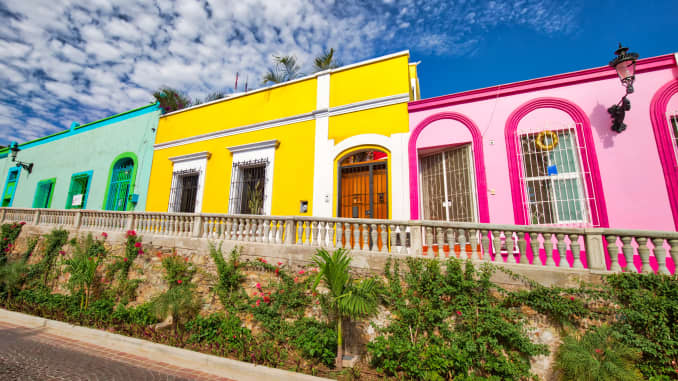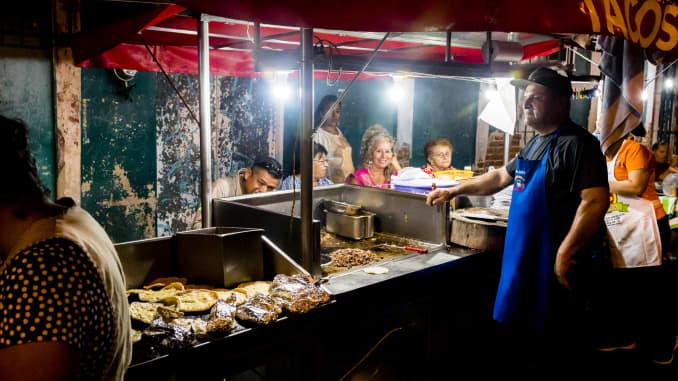Janet Blaser, @WHYWELEFTAMERICA
In 2006, on a wing and a prayer, I packed my bags and drove alone from California to Mazatlán, Mexico, a colorful resort town on the Pacific coast.

Matt Mawson
I didn’t know anyone there. But at 50, as the next half of my life came into focus, I had decided to prioritize deep, soul-level joy and happiness. I knew I wasn’t going to find that in Santa Cruz, where the internet had upended my career as a reporter for a local paper.
My annual gross salary was $35,000. Even with side hustles, including one as a house manager at a jazz club a few nights a week, I was still hard-pressed to make ends meet as it became increasingly expensive to live in California.
In search of happiness
Money difficulties aside, I liked my life in the U.S. I had a big community of friends. My three adult kids were financially stable and happily partnered.
Yet something was missing. Things that made other people happy left me restless and dissatisfied. I constantly felt like I wasn’t enough and didn’t have enough. I saw friends buying million-dollar homes, expensive cars and the newest phones. It felt like a game that couldn’t be won — and I wasn’t interested in playing anymore.
I had vacationed in Mazatlán the year before I moved. They say travel is good for the soul and opens you up to new possibilities. Walking the beach, swimming in the ocean and soaking up the sun, I pictured myself living a more reasonable kind of life: an affordable cost of living in a friendly, walkable city with loads of cultural events, great food and a gorgeous oceanside setting with year-round sunshine.

Colorful streets in historic city center of Mazatlán, MexicoElijah-Lovkoff | Getty
A sunnier, more affordable life
Securing permanent residency status in Mexico has changed a lot since 2006. And although it’s more complicated now, it’s still doable. (Requirements today include a certain amount of stable income, lots of paperwork and four years of temporary resident status. But the simple tourist visa allows you to stay in the country for six months.)
My first year in Mazatlán, I lived off a total of $9,500 ($5,000 in savings and $4,500 from a steady online editing job). Then I started the business I’d dreamed of — publishing M!, an arts and entertainment magazine, for nine years.

Since moving to Mazatlán, Janet says surfing has become part of her daily life. Matt Mawson
Time went by and suddenly I was 62. The idea of retiring and not working — even for myself — was thrilling, so I decided to take Social Security in 2018. Even though it was slightly under$1,000 (around $19,700 Mexican pesos), I knew it was enough if I watched my spending. With my magazine, I always had a steady cash flow from ad sales, so it was a change to only get paid once a month.
In 2019, I self-published a book, “Why We Left: An Anthology of American Women Expats.” Sales through Amazon bring in around $100 per month, which I put right into my savings.
Housing: In my 14 years of living in Mexico, my regular monthly expenses have hovered around $1,000. I’ve never paid more than $400 per month for a rental (and that was for a brand new 1,600-square-foot condo with ocean views). Now I pay about $200 for a one-bedroom.
Bills: Electricity is typically $10 a month, rising to about $35 in the summer depending on air conditioning. Wi-Fi and a cell phone plan (with unlimited international calls) each run about $18 per month.
Food and entertainment: I spend between $100 to $150 per month on gas for my car. You can go to a movie for under $5. I like going out to breakfast and pay about $6, including tip. A fancy dinner might cost around $18. My grocery bills are anywhere between $250 to $300 per month.

Tacos Raymundo, a family-run food stand serving one of Janet’s favorites: Papas locas — potatoes baked in an open fire, split and mashed with butter and sour cream, then covered with carne asada, guacamole and salsa mexicana. Fresh-made soft corn tortillas are used to scoop out mouthfuls of deliciousness.Matt Mawson
Healthcare: I use an international health insurance company for $1,500 per year, and my deductible is $1,000. If I have a cold or a simple health issue, I can go to any pharmacy and consult with a doctor for about $3. A visit to a specialist — like an ear, nose and throat doctor — might cost $35. Dental care is equally affordable; I recently paid $150 for a crown.
House calls: A plumber or handyman charges about $20 per visit. My vet makes house calls for routine checkups and vaccinations for my two cats, charging $12 to 20 per visit. Recently, an electrician spent six hours at my house installing a ceiling fan, and the bill was only $45. (Speaking Spanish and having local friends definitely helps avoid special expat prices.)
Home is where the heart is
There’s been lots of stumbling,but mostly it’s been smooth sailing. I smile more, relax easily and am more patient and open. I’m not as attached to material things.
Despite the heartstring pull of grandkids and the deep comfort of being around my children, I have no regrets about leaving the U.S.
When the pandemic started, they wanted me to be closer — in the country where I’m a citizen, where medical care seemed more reliable, and where doctors speak the same language. I’ve been in Oregon since April, feeling like a fish out of water as I wait to get vaccinated so I can go back home to Mexico.
As it barrels into the future, Mexico, like every country, has issues in its systems and politics, in the deep-rooted dynamics between rich and poor, the haves and have-nots. I don’t think everything is great there, because it’s not. But it’s my happy place. And that’s exactly what I was looking for.

Janet Blaser is a writer, editor and storyteller. She lives in Mazatlán, Mexico and feels very fortunate to be able to write about great food, amazing places, fascinating people and unique events. “Why We Left: An Anthology of American Women Expats” is her first book. Follow Janet on Facebook.
Source: cnbc.com





